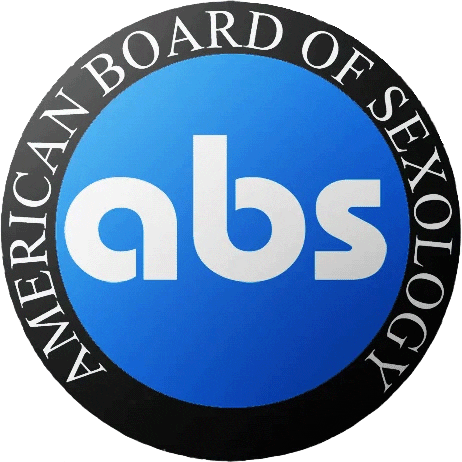Many people want to know the difference between sex coaching and sex therapy, and many sex coaches are mistakenly called sex therapists, so let’s explore what sex therapy is. You can learn more about the difference between sex coaching and sex therapy here.
What is sex therapy?
Sex therapy is a specialized form of psychotherapy and is only practiced by licensed mental health professionals, medical professionals, or social workers. It is similar to sex coaching in that it is a specific modality for discussing and working with sexual concerns (which are called “sexual dysfunctions” in sex therapy). Sex therapists are concerned with determining the physical or psychological reasons behind a client’s sexual concerns and then treating those concerns accordingly.
In some countries, a sex therapist is known as a psychosexual therapist, but the expertise and scope of practice is largely the same. For the sake of this article, we will use the term “sex therapist” to describe sex therapists and psychosexual therapists.
Most sex therapy is strictly talk-only, although instructional hands-on homework exercises may be given to clients after sessions. Sex therapists must abide by a strict code of ethics, and are often restricted in what they can say and what they can recommend.
There are many schools and training organizations around the world that train students in sex therapy, however, there is no legal requirement for sex therapists to be certified or accredited. Similar to sex coaching, any therapist can call themselves a sex therapist without having done sex therapy training. The difference, however, is that they must be a qualified and licensed therapist.
Many sex therapists are also trained as couples counselors or Marriage and Family Therapists and will use elements of this modality in their work.
How do I train as a sex therapist?
Every country has different requirements and legislation to train as and work as a sex therapist, so check your local requirements.
Sex therapy training is considered a post-graduate level training, so it is mostly only offered as a postgraduate diploma or certification, a Master’s Degree, or a doctorate/PhD. (The Certified Sex Coach™ training at Sex Coach U is considered equivalent to a Master’s Degree.)
Most training institutions require that the candidate has at least a Bachelor’s degree in psychology, or be qualified and practicing as a counselor, psychotherapist, social worker, or medical professional. Some training programs will also accept professionals working within sexual health, such as OB-GYNs, urologists, sexual health nurses, or midwives, but this depends on the program and their unique requirements.
If you are already trained as a psychotherapist or psychologist or have a Bachelor’s degree in Psychology, training as a sex therapist will take you a minimum of two years—but if you have no prior training or credentials in therapy or sexual health, you must complete this first, which means you could be looking at up to five years before you can start working as a sex therapist.
Beware of dubious programs that will “certify” you in a weekend! They will not give you any of the needed skills, knowledge, or expertise to work safely with clients.
Difficulties of working as a sex therapist

Photo by Christina Morillo from Pexels
While many people are interested in training as a sex therapist, they will encounter some barriers that may make this dream inaccessible.
First, it can be difficult to access the training in the first place. As we said above, if you have no prior training or credentials in therapy, psychology, or medicine, this means that it will take a long time and a lot of extra expense before you can start working. In addition to any therapy training or Master’s degree you earn (which can cost anywhere from $8,000 to $30,000), you must also pay for your supervision, and many training programs require you to engage in your own personal therapy, too.
Another significant barrier to access the training is that if you have done or are still working in the adult industry, many training programs or graduate degrees will not accept you at all. We believe this is highly discriminatory and ignores the skills, experience, and expertise that sex workers have in working with sexual concerns.
When you work as a sex therapist, you face more barriers depending on the professional organization you are a member of and their code of ethics. For example, many sex therapy professional organizations forbid their members and/or accredited or certified members from touching clients or from referring them to bodyworkers, sex workers, or even surrogate partner therapists. They can be very restricted in what they can and cannot say—especially if they are employed within an institution that has its own standards.
While we agree there needs to be boundaries in place to protect clients from harm, many professionals working as sex therapists find these rules too restrictive and it prevents them from giving their clients the help they really need.
At Sex Coach U, we believe that appropriate touch can be incredibly healing, and while we don’t train individuals to provide touch-based treatment, we endorse modalities such as sexological bodywork.
The history of sex therapy
Sex coaching and sex therapy share the same history, stemming from the work of sexology pioneers such as Kraft Ebbing, Havelock Ellis, Magnus Hirschfeld, Sigmund Freud, and Alfred Kinsey.
The first form of therapy was pioneered by the Father of Modern Psychotherapy, Sigmund Freud. He created psychoanalysis, and while many of his views are not generally accepted today (including that for women, a clitoral orgasm is “immature,” while a vaginal orgasm is “mature” and should be aimed for in partner sex), he does need to be credited for founding the concept of psychotherapy.
Psychoanalysis typically takes many years, and most sexologists, sex coaches, and sex therapists agree it is not effective at working with sexuality. However, psychoanalysis was the only accepted form of therapy to treat sexual concerns until the late 1950s, when Dr. William Masters and Virginia Johnson were the first to comprehensively research human sexuality.
Masters and Johnson recruited many couples volunteers and measured their sexual response in a laboratory in the 1950s—which was groundbreaking even for our attitudes today! From their research, they pioneered the first form of sexual therapy that was designed to be more effective, and most importantly, shorter-term than psychoanalysis.
Since then, many additional modalities have been included in sex therapy, including humanistic, Gestalt, Rational Emotive Behavioral Therapy (REBT), Cognitive Behavioral Therapy, and sexual medicine. Many sex therapists are also trained in other therapy modalities, including art therapy, dance therapy, EMDR, ritual, Transactional Analysis, Internal Family Systems, and more, which they include as part of their work with clients.
Many other notable pioneers have made significant contributions to sex therapy over the years, including:
Dr. Helen Singer Kaplan
Shere Hite
Dr. Gina Ogden
Betty Dodson
Dr. Beverly Whipple
Dr. David Ley
Dr. Marty Klein
Dr. David Snarch
How sex therapy has evolved
Masters and Johnson coined the four-stage model of the sexual response cycle, which is still used in sexology today. Since then, other models have been created to more accurately describe the human sexual experience to include the emotional, mental, contextual, and spiritual elements, as the original sexual response cycle has been criticized for being too linear and only based on physiological changes.
Dr. Helen Singer Kaplan introduced desire—the wanting to have or being responsive to sex in the first place—into the sexual response model, while Rosemary Basson created an entirely different model to explain that the linear model may describe a man’s sexual response, but not a woman’s.
We in the modern age may not agree with the attitudes, research methods, and results of the founders of sexology in the earlier years, but we need to remember the limitations of the cultures and beliefs of the times in which they lived.
Sex therapy has gone through many evolutions in the same way that psychotherapy was based on the cultural attitudes of the time. New and groundbreaking research on human sexual behavior, psychology, and sexological science comes out all the time. Most recently, there has been a shift toward de-pathologizing and embracing Gender, Sexuality, and Relationship Diversity (GSRD), and including more body-based and somatic methods..
Who can benefit from sex therapy?
Many people who can benefit from sex coaching can also benefit from sex therapy, and vice versa, however, there are some notable exceptions, such as:
- If the client is experiencing high levels of mental and emotional distress, or an untreated or unstable mental illness, they are better suited to working with a sex therapist or psychotherapist to resolve these issues first, as they are not coachable yet.
- If the client has unresolved trauma that has not been previously treated—the exception being if a sex coach has prior training, expertise, and/or credentials in working with trauma. Many sex coaches choose to take basic trauma awareness training or go on to do specific trauma training. However, some people are still not coachable yet and need a licensed mental health professional to help them process their traumas.
- If the client is unsure how much of their distress is from mental illness or is directly tied to a specific sex-related issue.
- If a client is looking for psychotherapy or a form of therapy that includes sexuality but doesn’t form all of the work.
It is imperative that a practitioner only work within the bounds of their training and ethics and refer out for anything that falls outside of those bounds. Beyond that, the choice to work with a sex coach or a sex therapist ultimately comes down to personal preference, and who you resonate with the most. It is said that what creates the most change for a client isn’t the therapeutic or healing modality that is used, but the relationship with the coach, therapist, or practitioner instead.
What are the requirements to work as a sex therapist?
In many countries, there is no legal requirement to have specific sex therapy training or credentials to call yourself a sex therapist, but there are certain professional requirements that show you are legitimate and qualified. This includes not just the credentials you have and where you trained, but the professional organization/s you are a member of.
It is highly encouraged for sex therapists to be part of a specific sex therapy or sexological professional organization. Because they are also trained as psychotherapists, counselors, or psychologists, they are usually a member of other therapy organizations, too.
In addition, here are just a few more requirements to working as a sex therapist:
- Engage in their own supervision with a qualified sex therapy supervisor
- Keep detailed client notes for each session
- Store all client notes securely
- Abide by a code of ethics
- Abide by strict physical and emotional boundaries with clients
- Complete a required number of CE credits each year and engage in their own professional development
- Work within their scope of practice and expertise
Many of these requirements we also recommend for sex coaches to work effectively and compassionately with clients, putting their welfare first.
Notable sex therapy organizations
There are numerous professional organizations around the world that sex therapists can join, and in many countries, there are a few to choose from, representing different schools of thought.
Here are a few that we acknowledge:
USA: American Association of Sexuality Educators, Counselors, and Therapists (AASECT)
United Kingdom: College of Sex and Relationship Therapists (COSRT)
Australia: Society of Australian Sexologists
Europe: European Federation of Sexology
Europe: European Society For Sexual Medicine (ESSM)
Worldwide: World Association for Sexual Health (WAS)
Worldwide: International Society For Sexual Medicine (ISSM)
Whether you decide to work with a sex coach or a sex therapist, we highly recommend you do your due diligence and be sure of the credentials and experience of whomever you choose.
Curious about training to become a Certified Sex Coach™? Join the next live Info Session to meet the SCU team and participate in a live Q&A!







